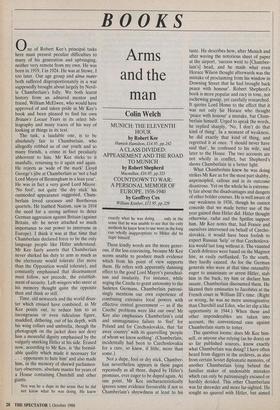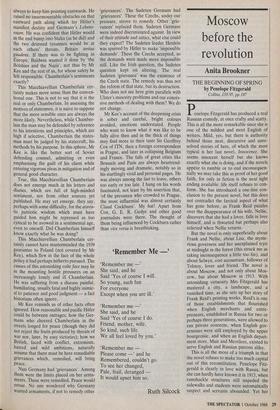BOOKS
Arms and the man
Colin Welch
MUNICH: THE ELEVENTH HOUR by Robert Kee Hamish Hamilton, £14.95, pp.242 A CLASS DIVIDED: APPEASEMENT AND THE ROAD TO MUNICH by Robert Shepherd
Macmillan, £16.95, pp.323
COUNTDOWN TO WAR: A PERSONAL MEMOIR OF EUROPE, 1938-1940 by Geoffrey Cox
William Kimber, £13.95, pp.229
0 ne of Robert Kee's principal tasks here must present peculiar difficulties to many of his generation and upbringing, neither very remote from my own. He was born in 1919, I in 1924. He was at Stowe, I too later. Our age group and alma mater both suffered disproportionately in a war supposedly brought about largely by Nevil- le Chamberlain's folly. We both learnt history from an admired mentor and friend, William McElwee, who would have approved of and taken pride in Mr Kee's book and been pleased to find his own Britain's Locust Years in its select bib- liography and many traces of his way of looking at things in its text.
The task, a laudable one, is to be absolutely fair to Chamberlain, who allegedly robbed us of our youth and so many friends, a crime in fact peculiarly abhorrent to him. Mr Kee sticks to it manfully, returning to it again and again. He rejects as 'wide of the mark' Lloyd George's jibe at Chamberlain as `not a bad Lord Mayor of Birmingham in a lean year'. He was in fact a very good Lord Mayor. `No fool', not quite `the dry stick' his outmoded appearance suggested, Cham- berlain loved crocuses and Beethoven quartets. He loathed Nazism, saw in 1934 the need for a strong airforce to deter German aggression against Britain (against Britain, nb: he never attached so much importance to our power to intervene in Europe). I think it was at that time that Chamberlain declared force to be the only language people like Hitler understand. Mr Kee fairly asserts that Chamberlain never shirked his duty to arm as much as the electorate would tolerate (far more than the Opposition would tolerate), and constantly emphasised that disarmament must follow, not precede, the establish- ment of security. Left-wingers who sneer at his memory thought quite the opposite then and think so still.
Time, old newsreels and the world disas- ter which ensued have combined, as Mr Kee points out, to reduce him to an incongruous or even ridiculous figure, muddled, dithering, out of his depth, with his wing collars and umbrella, though the photograph on the jacket does not deny him a mournful dignity emphasised by the vulgarly smirking Hitler at his side. Erased now, according to Mr Kee, is 'the formid- able quality which made it necessary for . . . opponents to hate him' and also made him, in the memory of shrewd parliamen- tary observers, absolute master for years of a House containing Churchill and other giants.
Nor was he a dupe in the sense that he did not know what he was doing. He knew
exactly what he was doing . . . only in the sense that he was unable to see that the only methods he knew how to use were in the long run wholly inappropriate to Hitler did he dupe himself.
These kindly words are the more gener- ous, if the less convincing, because Mr Kee seems unable to produce much evidence which from his point of view supports them. He refers with apparently damning effect to the good Lord Mayor's parochial- ism and insularity. For instance, while urging the Czechs to grant autonomy to the Sudeten Germans, Chamberlain patroni- singly mentions our own experience of combining extensive local powers with effective central government — as if the Czechs' problems were like our own! Mr Kee also emphasises Chamberlain's cold and unimaginative failure to 'feel' for Poland and for Czechoslovakia, that `far away country' with its quarrelling `people of whom we know nothing'. (Chamberlain, incidentally had been to Czechoslovakia for a cure, so knew, if little, more than some.) Not a dupe, fool or dry stick, Chamber- lian nevertheless appears in these pages repeatedly as all three, duped by Hitler's promises, ever eager to be duped again. At one point, Mr Kee uncharacteristically ignores some evidence favourable if not to Chamberlain's shrewdness at least to his taste. He describes how, after Munich and after waving the notorious sheet of paper at the airport, `success went to [Chamber- lain's] head, and he made what even Horace Wilson thought afterwards was the mistake of proclaiming from his window in Downing Street that he had brought back peace with honour'. Robert Shepherd's book is more popular and racy in tone, not eschewing gossip, yet carefully researched. It quotes Lord Home to the effect that it was not only Sir Horace who thought `peace with honour' a mistake, but Cham- berlain himself. Urged to speak the words, he replied sharply, 'No, I don't do that kind of thing'. In a moment of weakness, he did exactly that kind of thing, and regretted it at once. 'I should never have said that', he confessed to his wife, and later to the House. The two accounts are not wholly in conflict, but Shepherd's shows Chamberlain in a better light.
What Chamberlain knew he was doing strikes Mr Kee as for the most part shabby, unprincipled, callous and in its outcome disastrous. Yet on the whole he is extreme- ly fair about the disadvantages and dangers of other bolder courses. He is well aware of our weakness in 1938, though he cannot concede that we made better use of the year gained than Hitler did. Hitler thought otherwise, radar and the Spitfire support him. Mr Kee notes that, had France and ourselves intervened on behalf of Czecho- slovakia, it would have been foolish to expect Russian `help' or that Czechoslova- kia would last long without it. The vaunted Czech defences were based on the Maginot line, as easily outflanked. To the south, they hardly existed. As for the German generals who were at that time ostensibly eager to assassinate or arrest Hitler, stab him in the back, try him or declare him insane, Chamberlain discounted them. He likened their emissaries to Jacobites at the French court in William III's time. (Right or wrong, he was no more unimaginative than Churchill and Eden, who let slip a like opportunity in 1944.) When these and other imponderables are taken into account, the conventional case against Chamberlain starts to totter.
The question looms: does Mr Kee him- self, or anyone else relying (as he does) on so far published sources, know exactly what Chamberlain was doing? I have often heard from diggers in the archives, as also from certain Soviet diplomatic memoirs, of another Chamberlain lying behind the familiar maker of undeniable mistakes which can only be patronisingly excused or harshly derided. This other Chamberlain was far shrewder and more far-sighted. He sought no quarrel with Hitler, but aimed always to keep him pointing eastwards. He raised no insurmountable obstacles on that eastward path along which lay Hitler's manifest destiny and Germany's Lebens- raum. He was confident that Hitler would in the end bump into Stalin (as he did) and the two detested tyrannies would be at each others' throats, Britain tertius gaudens. If there was to be fighting in Europe, Baldwin wanted it done by 'the Bolshies and the Nazis', not thus by Mr Kee and the rest of us, for whose safety he felt responsible. Chamberlain's sentiments exactly?
This Macchiavellian Chamberlain cer- tainly makes more sense than the conven- tional one. This is not to say that it is the real or only Chamberlain. In assessing the motives of statesmen, it is naive to suppose that the more sensible ones are always the more likely. Nevertheless, while Chamber- lain the man may be defended by reference to his intentions and principles, which are high if selective, Chamberlain the states- man must be judged by his statecraft, his methods by his purpose. In this sphere, Mr Kee is like the better sort of Soviet defending counsel, admitting or even emphasising the guilt of his client while entering vigorous pleas in mitigation and of general good character.
True, this Macchiavellian Chamberlain does not emerge much in his letters and diaries, which are full of high-minded sentiment, nor from other sources yet published. He may yet emerge, they say, perhaps with some difficulty, for the atavis- tic patriotic wisdom which must have guided him might be repressed as too cynical to be avowed in a sentimental age, even to oneself. Did Chamberlain himself know exactly what he was doing?
This Macchiavellian Chamberlain cer- tainly cannot have masterminded the 1939 guarantee to Poland (not covered by Mr Kee), which flew in the face of the whole policy it had perhaps hitherto pursued. The causes of this astonishing volte face may lie in the mounting hostile pressures on an Increasingly lonely and ill Chamberlain. He was suffering from a disease painful, humiliating, usually fatal and highly inimic- al to patience and good judgment — a fact historians often ignore.
Mr Kee reminds us of other facts often Ignored. How reasonable and pacific Hitler could be between outrages; how the Ger- mans who cheered Chamberlain in the streets longed for peace (though they did not reject the fruits produced by threats of war nor, later, by easy victories); how we British, faced with conflict, extremism, hatred and wild ambitions, naturally assume that there must be here remediable grievances which, remedied, will bring peace.
Nazi Germany had 'grievances'. Among them were the limits placed on her arma- ments. These were remedied. Peace would ensue. No one wondered why Germany wanted armaments, if not to remedy other `grievances'. The Sudeten Germans had `grievances'. These the Czechs, under our pressure, strove to remedy. Other 'grie- vances' replaced them. Sudeten Germans were indeed discriminated against. In view of their attitude and antics, what else could they expect? The Sudeten leader Henlein was spurred by Hitler to make 'impossible demands'. These the Czechs accepted, so the demands were made more impossible still. Like the Irish question, the Sudeten question kept on altering. The real Sudeten 'grievance' was the existence of the Czech state. The remedy was thus not the reform of that state, but its destruction. Who does not see here grim parallels with Ulster's minority problems and our conces- sive methods of dealing with them? We do not change.
Mr Kee's account of the deepening crisis is sober and careful, bright colours avoided, emotions understated. People who want to know what it was like to be fully alive then and in the thick of things may find more to their taste Sir Geoffrey Cox of ITN, then a foreign correspondent in Prague, and later in collapsing Belgium and France. The falls of great cities like Brussels and Paris are always heartrend- ingly moving and dramatic, notably so in his startlingly vivid and personal pages. He was always among the last to leave, others too early or too late. I hung on his words fascinated, not least by his assertion that, 'of the pressmen who crowded to Prague, the most influential was almost certainly Claud Cockburn'. My hat! Apart from Cox, G. E. R. Gedye and other good journalists were there. The thought of them being influenced by Cockburn rather than vice versa is breathtaking.



































































 Previous page
Previous page